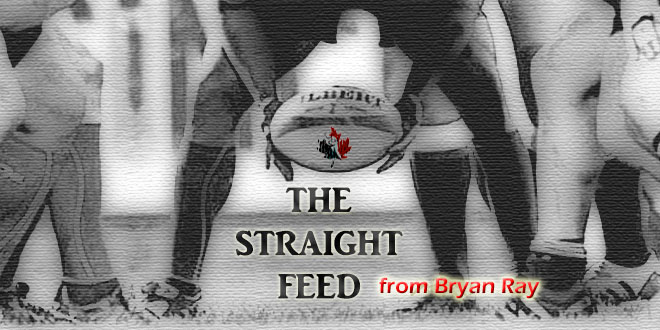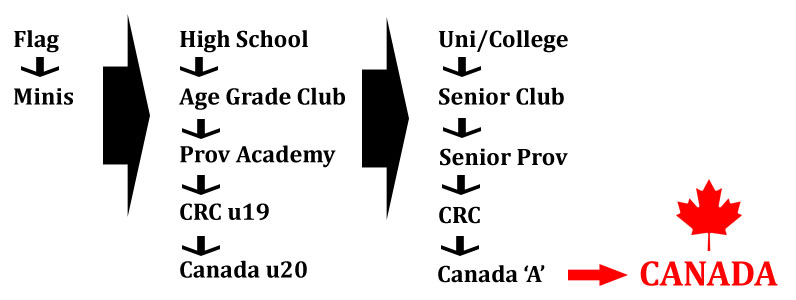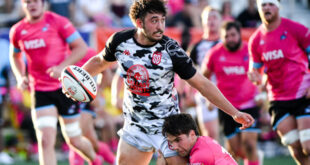Now that the euphoria of the Vancouver 7s has faded it’s time to get back to serious business. To steal a phrase from Chris LeFevre’s open letter, Canadian rugby is ‘heading into the abyss’ and it’s time to start clawing our way out. Conveniently Rugby Canada’s Annual General Meeting is this weekend in Toronto. They might want to sell tickets for this one as it promises to be the most eventful administrative weekend in recent memory.
The first order of business must be to address a perceived disconnect between Rugby Canada and the general rugby populace. A flimsy statement released following the defeat to Brazil did little to assuage that concern. It’s a difficult situation we find ourselves in and despite the words of Jim Dixon – General Manager of Rugby Operations and Performance – there’s no quick fix.
“Our stated goal is to qualify for the 2019 World Cup and improve on our results. We will not waiver from these objectives. We will analyze all aspects of our performance in the ARC and make the necessary adjustments to ensure the best possible outcome in the June series.”
Losing to Uruguay was a disappointment, though many saw it coming. A fair few pundits picked the Teros to win at home given Canada’s poor form in the opening rounds of the Americas Rugby Championship. The collapse in São Paulo was disheartening, an icy cold dose of reality, but let’s not pretend this was a bolt from the blue.
Starting on September 19, 2011, Canada enjoyed one glorious week in the sunshine with a 73.74 points grading, good enough for 11th place on the official World Rugby Rankings. It was Canada’s highest point since the ranking system was introduced in September of 2003. Two years later we were still at a healthy 14th but by the end of 2013 we hit the wall.
In 31 test matches since June of 2014 Canada has won just seven times. Of those only Georgia was ranked higher, a one-point win during the 2015 World Cup warm-ups. That was Canada’s only test win in 11 attempts. A 17-13 result over Namibia was the only win out of six the previous year. 0-3 vs Romania, 0-3 vs Japan, 0-5 vs the USA.
On March 3, 2017, the scoreboard at the Estádio do Pacaembu read Brazil 24, Canada 23 on full time. The World Rugby Rankings were published on Monday. Canada were at their lowest, with a score of 59.63 they were in 23rd, behind Germany and Spain. Germany have since fallen bumping Canada up to 22nd, marginally above Kenya.
If Canada pulls off an upset over the Eagles this summer – and make no mistake, the USA will be heavy favorites to qualify in the Americas 1 spot – is everything right in the eyes of Langford? This isn’t to say that Canada won’t make it to RWC 2019. There is a hint of doubt given Uruguay’s significant progress, but the odds are still very much in our favor to claim Americas 2 or worst case scenario the dreaded repechage. Somewhere along the line we were going to come second to the USA, it might as well be now.
Rugby Canada’s response to the ARC failure was less than exemplary. Speaking to Neil Davidson of the Canadian Press, Chairman Tim Powers said that Rugby Canada would approach World Rugby about potentially participating in the ARC as an ‘A’ side, as Argentina do, to avoid losing further ground in the rankings. This is shameful behavior. It’s akin to the poor loser who picks up his ball and goes home when things start getting a bit rough. A year ago a less experienced Canadian side scored more than 50 points at Westhills Stadium against a Brazilian team of virtually identical strength. The Provinces must denounce this thought process at the AGM. If Canada enter as an ‘A’ side, what’s to stop the USA from doing the same? It undermines what is becoming a wonderful tournament for the Americas.
If Canada wants a ‘fair shake’, it should be asking for the support of the other nations to demand that Argentina also risks ranking points in their matches. The UAR’s excuse is that the best Pumas are all tied up with the Jaguares in Super Rugby. Of course the fact that every other team in the competition is without their European stars seems to be lost on the Argentines. Stand up for the tournament and double down, don’t back away. The fact is Canada needs to be consistently better than Uruguay and Brazil regardless of where the game is played and who is on the field wearing the Maple Leaf. After all, we’ll need to make up those ranking points somewhere down the line.
Another suggestion from some corners seems to be that Canada needs to decide between success at sevens and XVs on the international stage. Thankfully Dr. Pat Parfrey, for one, does not agree. There is no decision to be made in that regard. Canada must compete in both arenas and must find a way to succeed at both – at the same time. Those who suggest that adding our sevens players to the ARC would guarantee success do not understand the requirements of the modern game. There will be the odd player who could move back and forth, but those should be the exceptions rather than the rule. Some players are simply better suited to sevens than XVs, and in today’s world that is not in any way an insult, it’s just a fact.
It’s hard to blame anyone for wanting to do well at the Olympics, or at least qualifying for them, but at the same time tough decisions that weren’t made early ended up sinking both ships in the last cycle. Too many players were committed to both the World Cup and the Olympics, and the unfortunate truth is that the timing of the two makes it impossible to do both. It’s no coincidence that only two players total across the medal-winning Olympic teams appeared at the World Cup.
Of course the obvious riposte is that the medalists – Fiji, Great Britain, and South Africa – are each nations overflowing in rugby talent who are more than capable of fielding sevens and XVs teams fully independent of each other. Canada does not boast such readily available depth, and therein lies the rub.
Canada’s men’s shortcomings at the highest level are not for lack of talent but lack of preparation, and not the kind you solve with an extra practice on Wednesday. Our players start too late at the bottom and have nowhere to go at the top. What we need is a clearly defined pathway in Canadian rugby – something more specific than the long term development curriculum– that starts from the first exposure to rugby and ends at senior international level. Such a road map might look like this:
Once a pathway is agreed upon it can be applied across the country, to every stream: men and women, sevens and XVs, players, coaches, and match officials. It will take more commitment from an already stretched community but there is no other way. We cannot sit around with our thumbs in the air waiting for the Pro 12 or Super Rugby to pick us up. It’s absolutely critical that we develop a cohesive domestic strategy before we fall further behind the pack.
Where does Rugby Canada enter in the equation? Provide the framework and support. Find the funding for Regional Development Officers. They can double as high performance monitors, keeping track of national level talent, but their primary focus should be to establish grass roots rugby programs – Rookie Rugby is a great start – and liaise with clubs and schools and provide technical support. A development officer in each province is a long-term goal, but in the short the RDOs must be a priority.
It would be remiss to ignore the success of the women’s program, high achievers in both codes while receiving funding from external sources. The Monty Heald Fund subsidizes the XVs program while the Bronze Medal at the Olympics earned the 7s side a $2m payday from Own The Podium while the men were dropped completely. On the development front the women’s CIS university program has proved a major source of talent. With former Rugby Canada CEO Graham Brown now heading up the CIS program (re-branded USports), lobbying for a men’s equivalent is a worthwhile endeavor though it should be noted that the OUA is already well established and both UBC and UVic play in the CDI Premier League.
At the high performance level it’s time for the Provinces to step out of the shadows and take the lead. Revive the senior provincial programs as a stepping stone to regional selection. The CRC should have a long-term goal of going professional, which means running completely independent from Rugby Canada. That means finding their own league-wide and individual team sponsorship and establishing their own academy programs. An immediate return to six games at a minimum with every game streamed live. PRO Rugby would have been a perfect fit but it has come and gone, so perhaps it’s Major League Rugby that will provide cross-border opportunities going forward.
At international level let the players decide what they want to achieve on the field. Rugby Canada’s sole purpose should be to hire qualified coaches and remove obstacles to success. With the national training centre nearing completion that means finding complete funding for all national teams. Men’s and women’s Senior, Senior ‘A’, u20s, 7s, and Maple Leafs. Pay-to-play at those levels must be eliminated. The commercial arm will need to find new revenue streams and negotiate some kind of a consistent broadcast deal. Did anyone notice that the Toronto Wolfpack’s rugby league games are now being streamed on the CBC website?
Prominent USA Rugby personality Tony Ridnell, a two-time World Cup attendee with the Eagles, asked current England supremo Eddie Jones recently what he thought the Americans should do to take the next step. High on Eddie’s list of advice was to ignore RWC 2019 results and concentrate coaching resources on the u20s to prepare for RWC 2023. When the Provinces come together at the AGM this weekend the discussion shouldn’t be about sevens vs XVs, it should be about today vs tomorrow. Eddie’s bottom line seems simple enough.
“Create a plan and execute.”
 Americas Rugby News Rugby news from across the Americas!
Americas Rugby News Rugby news from across the Americas!





